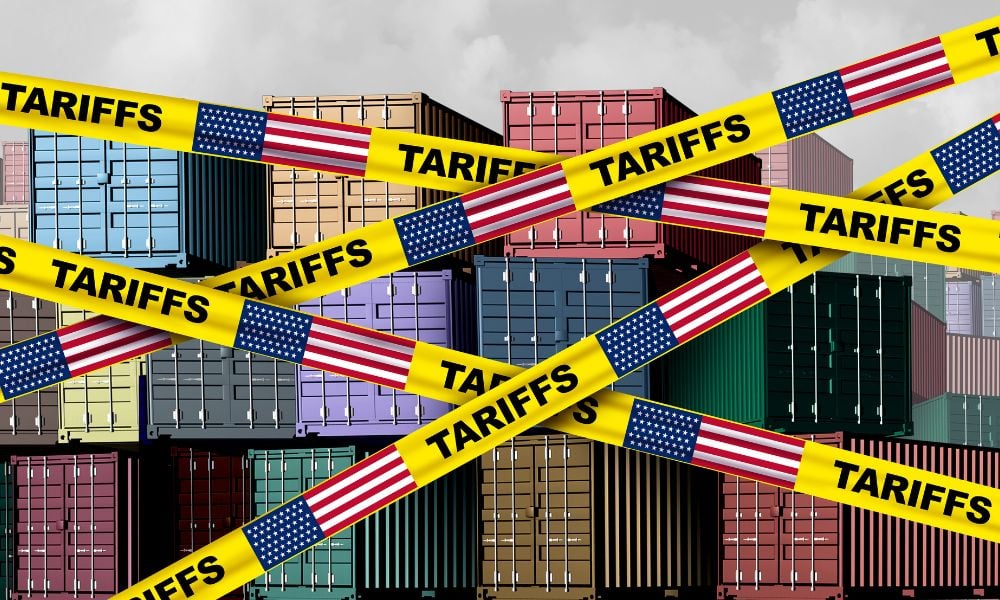Canada faces trade uncertainty as Trump targets tariffs and NATO spending, calling it a "serious contender"

US President Donald Trump has imposed reciprocal tariffs on countries that charge higher tax rates on US imports.
According to BNN Bloomberg, the proclamation, signed on Thursday, could have wide-reaching effects on global trade, impacting both allies and economic rivals of the United States.
Trump stated, “I’ve decided for purposes of fairness that I will charge a reciprocal tariff. It’s fair to all. No other country can complain.”
At 10 am EST, Trump unveiled a roadmap for implementing reciprocal tariffs, which will match the higher duty rates charged by other countries. The tariffs will be tailored to each nation and could take effect within weeks.
A White House official stated that Trump’s trade and economic team will study trade relationships, beginning with countries that have high trade surpluses and tariff rates.
Trump’s reciprocal tariffs will also address non-tariff trade barriers, such as value-added taxes, subsidies, regulations, and currency policies. He stated that he is open to reducing tariffs if other countries lower theirs.
An official added that value-added taxes in the European Union would be considered trade barriers in tariff calculations.
Former finance minister and Liberal leadership hopeful Chrystia Freeland published an opinion piece in the New York Times, calling Trump’s proposed 25 percent tariffs on Canadian imports “economic self-mutilation.”
She argued that “America First need not mean America Alone” and warned that a trade war with Canada would force allies to seek new partners.
A Leger poll suggested that 81 percent of Canadians have increased their purchases of Canadian-made goods in response to Trump’s policies.
However, only 28 percent indicated they would cancel subscriptions to US streaming services like Netflix and Disney+.
The US confirmed Brooke Rollins as Secretary of Agriculture. Rollins will play a key role in trade disputes with Canada, a major supplier of potash.
In 2023, the US imported $4.9bn in potash, according to Statistics Canada.
The American Fertilizer Institute urged Trump to exempt Canadian potash and other fertilizers from tariffs, citing the need for reliable supply ahead of the spring planting season.
Mark Carney, a candidate for the Liberal Party leadership, commented on Canada-US trade relations. During a platform event in Vancouver, Carney emphasized the importance of strengthening Canada’s economy and leaving trade negotiations to government officials.
Trump reiterated that Canada contributes too little to NATO, claiming it is “just about the lowest payer.”
Canada has pledged to reach NATO’s two percent GDP target by 2032, but the Parliamentary Budget Officer estimated that Canada’s 2024 contribution would be 1.37 percent.
Trump argued that Canada would only succeed if it contributed more or became a US state.
Trump criticized Canada’s trade policies, stating, “Canada’s been very bad to us on trade.”
He claimed that Canada relies on the US for 95 percent of its trade but argued that the US does not need Canadian products.
Trump also mentioned a US$200bn subsidy to Canada, though the basis of this figure remains unclear.
The trade deficit last year was estimated at approximately US$45bn.
He referred to Canada as a “serious contender” to become the 51st state and said he had discussed tariffs with “Governor Trudeau.”
Manitoba Premier Wab Kinew described his meetings in Washington as productive, despite no sign of a shift in US tariff plans.
Kinew met with US Secretary of the Interior Doug Burgum, emphasizing that his new role provides Manitoba with a point of contact in the administration.
Kinew also had a brief exchange with Tesla CEO Elon Musk, a key Trump adviser.
Financial Post reported that while Trump has not specified how Canada will be affected, he has criticized the country’s digital services tax, which generates over US$500m from American companies.
The White House issued a statement that reciprocal tariffs will “bring back fairness and prosperity” to the US trade system.
Carleton University professor Fen Osler Hampson believes Canada may avoid direct impact due to free trade agreements but noted that US consumers will likely bear the economic burden of the tariffs.
Analysts warned that reciprocal tariffs could increase costs for American consumers, as importers pass price hikes to retailers.
Tariffs are expected to impact developing nations, particularly India, Brazil, and Vietnam, due to their higher tariffs on US goods.
Carleton University professor Fen Osler Hampson compared reciprocal tariffs to “an eye for an eye” trade policy, stating that they would escalate trade conflicts. He suggested that the tariffs might ultimately push the US toward new trade deals, as American consumers will face rising costs.
Trump has also proposed additional tariffs on cars, semiconductors, and pharmaceuticals beyond the reciprocal tariffs.
According to Deutsche Bank economists, reciprocal tariffs could increase the weighted average tariff rate on US imports from 1.5 percent in 2022 to 4.8 percent.
Analysts predict that these tariffs could drive inflation above 3.5 percent in 2025.



